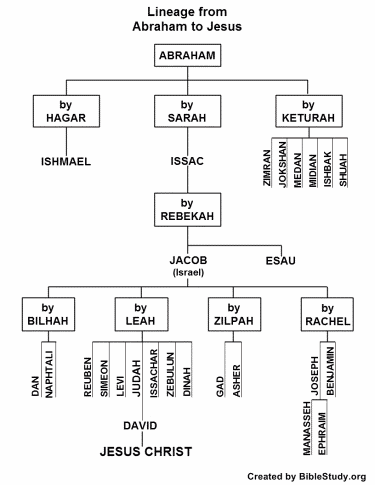
Read Matthew 1:1-6
Matthew begins the Christmas story with the genealogy of Jesus. This is extremely important because Matthew is writing his gospel to convince the Jews that Jesus of Nazareth was the God-sent Messiah because He fit the two critical requirements.
- The first one was the Messiah must be from the tribe of Judah. This goes back to the Old Testament prophecy that said Judah would remain on the throne of Israel. Therefore, the Messiah had to come from the tribe of Judah.
- The second was the Messiah must be from the line of David. This goes back to a promise God made to David while David was on the throne; that God was going to raise up an heir from David’s line that would sit on the throne forever and establish an eternal Kingdom over which He would reign.
As you go down through the genealogy from Abraham to Jesus, notice Matthew said Jesus was the Son of David, and therefore, the rightful heir to David’s throne. Since Jesus revealed His Deity throughout the gospels, it becomes clear that the Son of David is also the Son of God, the Messiah, and the eternal King of Israel that is to sit on David’s throne forever, for had Jesus not been in the lineage of Abraham and David, His birth, His life, His ministry, His message, His death – even His resurrection would not have been sufficient for our salvation. In other words, the “story” would have been just that – a “story!”

As you trace the lineage from Abraham to Jesus, notice the “Messianic Line” runs from Abraham, through his wife Sarah to Isaac, through his wife Rebekah to Jacob, and then it gets very interesting. While God allowed Jacob to have four wives, it was through Leah that Judah was born, who fathered Perez, Herzon, Ram, Amminadab, Nashon, Salmon, Boaz, Obed, and then Jesse, the father of David, the 13 generations from Abraham. Tomorrow, we will look at the generations from David to Jesus.
The genealogy of Jesus illustrates God’s sovereignty in protecting the “bloodline of the seed” through the many generations, but it also demonstrates God’s mercy. If you notice, there are four women listed in this genealogy.
- Tamar – Vs. 3 – a seducer and adulteress whom God saved from death.
- Rahab – Vs. 5 – a Gentile, rejected by the Jews and a prostitute, but was saved from judgment because of her expressed faith in the God of Israel.
- Ruth – Vs. 5 – a woman from a nation that was hated by the Jews but who still “chose” to be associated with God and His people.
- Bathsheba – Vs. 6 – who committed adultery with David, but sought and received God’s forgiveness.
The fact that these four women are in the recorded genealogy of Jesus proves, “no pit of sin is so deep that God’s love is not deeper still.” God will extend His mercy and His grace upon anyone who will receive it. Like the rest of us, these four women sinned, and sinned greatly, but they were also forgiven and forgiven eternally. We will hear their testimonies in heaven soon.
